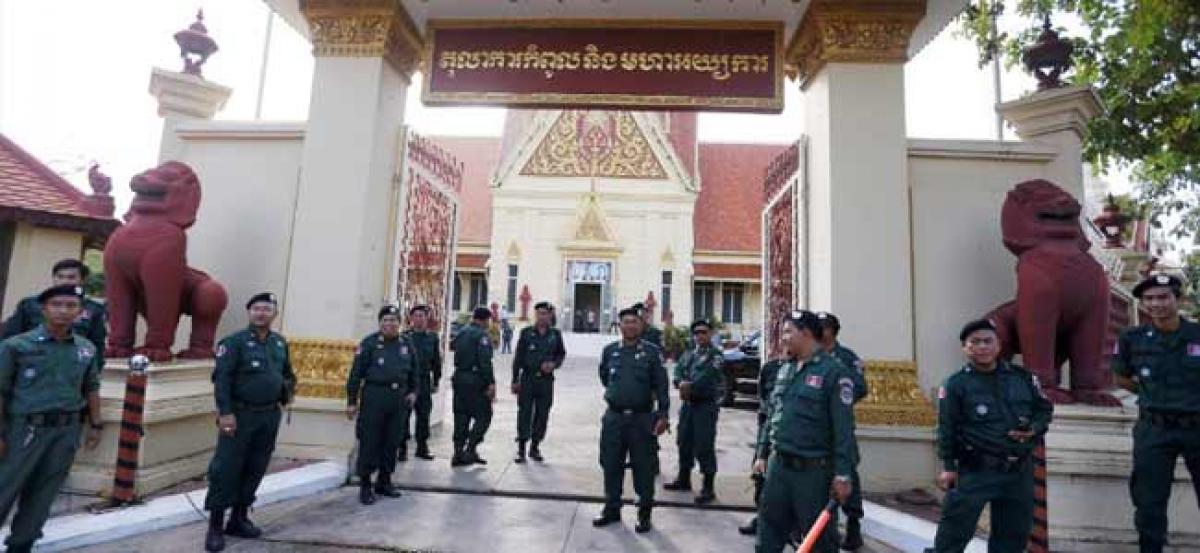Live
- Big e-commerce firms to adopt Safety Pledge on National Consumer Day
- Cop ends life over torture by wife, father-in-law in Bengaluru
- Indian Constitution longest and most beautiful, Kiren Rijiju lauds its inclusive character
- BSNL's Rs 333 Plan Challenges Airtel and Jio with 1300GB Data: Details
- PM Modi's appeal to buy Khadi garments leads to huge demand in Bihar's Samastipur
- Mohammad Amir announces retirement from international cricket
- Chandrababu supports One Nation, One Election System, says elections in 2029
- Cong not pursuing politics of vengeance: D. K. Shivakumar on Covid 'scam' FIR
- Mexican consulates to strengthen support for nationals in face of US deportation
- Minister Meghwal to table ‘One Nation, One Election’ Bill in Lok Sabha on Monday
Just In

The United States stopped election support for Cambodia with a promise of more “concrete steps” and the European Union threatened vital trade preferences after the main opposition party to Prime Minister Hun Sen was banned.
PHNOM PENH: The United States stopped election support for Cambodia with a promise of more “concrete steps” and the European Union threatened vital trade preferences after the main opposition party to Prime Minister Hun Sen was banned.
But China said it supported Cambodia in following its own path, making no criticism of the government led by the former Khmer Rouge commander who is one of Beijing’s most important allies in Southeast Asia after more than three decades in power.
The ban on the Cambodia National Rescue Party (CNRP), decreed by the Supreme Court at the government’s request, followed the arrest of its leader for treason. Kem Sokha is accused of plotting to take power with American help.
Hun Sen’s critics called the CNRP dissolution an attempt to steal the election and the death knell for democracy. Western donors have spent billions of dollars since 1993 trying to build a multiparty system following decades of war.
“On current course, next year’s election will not be legitimate, free or fair,” a White House statement said, promising to take “concrete steps”.
The first of those was to end support for the Cambodian National Election Committee ahead of the 2018 election, it said. In April, the U.S. embassy announced a $1.8 million grant to assist local elections in 2017 and next year’s general election.
In Brussels, an EU spokesman said the election could not be legitimate without the opposition and noted that respect for human rights was a prerequisite for Cambodia’s access to EU trade preferences under its “Everything But Arms scheme.”
That scheme, giving tariff-free access, and similar trade preferences in the United States have helped Cambodia build a garment industry on low-cost labour. Between them, EU and U.S. markets take some 60 percent of Cambodia’s exports.
“I am very worried after the dissolution of the party,” factory sewer Heng Kheang, 35, said as other colleagues nodded in agreement at their lunch break. “Workers will be most affected, more than the rich.”
In a symbolic step, the U.S. Senate passed a resolution calling on the Treasury and State departments to consider placing Cambodian officials implicated in abuses on a watch list for asset freezes and travel bans.
Huy Vannak, undersecretary of state at Cambodia’s Interior Ministry who is close to Hun Sen, said the U.S. position was “made without consideration to the evidence and court hearing”.
“We hope that the U.S. will consider the overall bilateral relations with Cambodia and continue to collaborate with common interests of both countries,” he said.
In Beijing, foreign ministry spokesman Geng Shuang told a news briefing that China supported Cambodia in pursuing its own development path. China is by far the biggest single donor to Cambodia and its biggest investor.
WAR OF WORDS
Hun Sen has been in a deepening war of words with the U.S. embassy and State Department over a crackdown on his critics, but at the weekend posed with U.S. President Donald Trump at a regional summit and praised his policies of non-interference.
The fact that the threat of action came from the White House gave it greater weight than previous statements from the State Department calling for the release of Kem Sokha.
So far, Western countries have shown little appetite for sanctions and the opposition itself has shied away from calling for steps to restrict garment exports because of the hundreds of thousands of workers who depend on them.
But leaders of the CNRP now say they support some sanctions.
“Sanctions are the best leverage for negotiation for free, fair and inclusive elections,” said Mu Sochua, a deputy to CNRP leader Kem Sokha, who fled Cambodia fearing arrest.
There have been no protests over the opposition party ban and many people in the capital, Phnom Penh, said they were afraid to speak out.
There were no party members at the CNRP headquarters on Friday, only security guards. “They are worried about their safety,” said guard Chin Savy.
The central market was full of its usual bustle and one man told Reuters he was glad to see the back of the opposition.
“Hun Sen has a lot of help from China. If he just depended on the U.S., we wouldn’t be anywhere,” said Khen Kong, 69, a businessman.
In a televised address on Thursday, Hun Sen told Cambodians the election would go ahead “as normal” and appealed to politicians from the CNRP who had not been banned to join his Cambodian People’s Party.
U.N. High Commissioner for Human Rights Zeid Ra’ad Al Hussein expressed grave concern about the conduct of credible elections next year as well as a clampdown on civil rights groups and independent media.

© 2024 Hyderabad Media House Limited/The Hans India. All rights reserved. Powered by hocalwire.com







